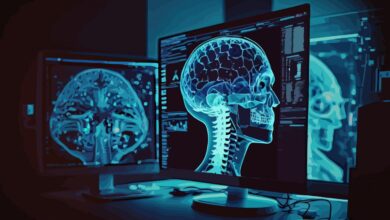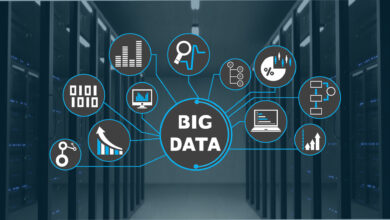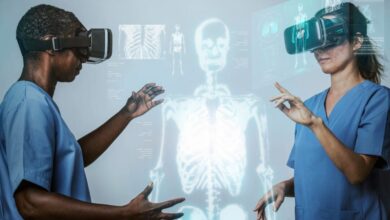The Rise Of Ai In Healthcare From Diagnosis To Drug Discovery

The Rise of AI in Healthcare: From Diagnosis to Drug Discovery – The Rise of AI in Healthcare From Diagnosis to Drug Discovery marks a pivotal moment in the evolution of medical practices. Artificial intelligence, once a concept of science fiction, is now a transformative force in healthcare, revolutionizing the way we diagnose diseases, personalize treatments, and discover new drugs. As we delve into this fascinating intersection between technology and medicine, we uncover the significant milestones and innovations that have propelled AI to the forefront of healthcare applications.
From enhancing diagnostic accuracy to tailoring individualized treatment plans, AI is reshaping patient care and improving outcomes. With its ability to analyze vast amounts of data swiftly and effectively, AI is helping healthcare professionals make informed decisions and streamline processes. This exploration will highlight the remarkable advancements and ongoing challenges in integrating AI into the healthcare sector.
The Evolution of AI in Healthcare
The integration of Artificial Intelligence (AI) into healthcare has transformed the medical landscape over the past several decades. From early theoretical concepts to the advanced applications we see today, AI has continuously evolved, bringing new methodologies and insights into patient care, diagnosis, and treatment. This evolution has been fueled by technological advancements, increasing computational power, and an expanding understanding of data science within the medical field.
The historical journey of AI in healthcare began in the 1950s, with initial explorations into the use of computer algorithms for problem-solving in medical diagnosis. Over the years, several key milestones have emerged, marking significant advancements in this field. Among these milestones are the development of expert systems, machine learning techniques, and deep learning algorithms, which have collectively shaped how AI is applied in clinical settings today.
Key Milestones in AI Development, The Rise of AI in Healthcare: From Diagnosis to Drug Discovery
Significant progress in the field of AI has been characterized by various milestones that have paved the way for current innovations. Understanding these milestones is essential for grasping the broader context of AI in healthcare. Here are some noteworthy developments:
- 1956 – Dartmouth Conference: This event is widely regarded as the birth of AI as a field of research. It brought together key figures who would lay the groundwork for future research.
- 1972 – MYCIN: A pioneering expert system designed for diagnosing bacterial infections and recommending antibiotics, marking one of the first practical applications of AI in medicine.
- 1997 – IBM’s Deep Blue: Deep Blue defeated world chess champion Garry Kasparov, showcasing the potential of AI in strategic decision-making, which later inspired healthcare applications.
- 2012 – Breakthrough in Deep Learning: The introduction of deep learning techniques, particularly convolutional neural networks (CNNs), revolutionized image analysis, significantly impacting medical imaging diagnostics.
- 2017 – AI in Radiology: The FDA approved the first AI algorithms for clinical use in radiology, enabling the automated detection of abnormalities in medical images.
Major Innovations Shaping AI Applications
The evolution of AI technologies has led to several innovations that are reshaping healthcare delivery. These innovations include advancements in data analytics, natural language processing, and predictive modeling, each enhancing the capabilities of healthcare systems.
- Data Analytics: The ability to analyze large sets of health data has allowed for improved patient outcomes through personalized medicine.
- Natural Language Processing (NLP): NLP enables computers to understand and interpret human language, aiding in the processing of clinical notes and patient records to inform decision-making.
- Predictive Modeling: AI algorithms can predict disease outbreaks and patient deterioration by analyzing historical and real-time data, enabling proactive interventions.
- Robotic Surgery: AI-driven robotic systems enhance precision in surgical procedures, reducing recovery times and improving outcomes for patients.
- Telemedicine: AI chatbots and virtual assistants are streamlining patient interactions and diagnostics, making healthcare more accessible.
The integration of AI in healthcare is not just about technology; it’s about improving patient care and outcomes through innovative solutions.
AI in Medical Diagnosis
The integration of artificial intelligence (AI) into medical diagnosis is revolutionizing the way healthcare providers identify and manage diseases. By employing sophisticated algorithms and data analysis techniques, AI systems are enhancing the accuracy and efficiency of diagnostic processes, ultimately leading to better patient outcomes.
AI technologies utilize various algorithms to analyze medical data, such as imaging studies, pathology reports, and genetic information, to assist healthcare professionals in making informed decisions. These algorithms can vary widely, but some of the most commonly used include machine learning, deep learning, and natural language processing. These methods allow AI to recognize patterns and anomalies in data that may be imperceptible to human observers.
AI Algorithms Used in Diagnosing Diseases
A variety of AI algorithms have shown promising results in diagnosing diseases across numerous medical fields. Understanding the specific algorithms helps to appreciate their application in real-world scenarios. Below are some key algorithms and their applications:
- Convolutional Neural Networks (CNNs): Predominantly used for image processing, CNNs excel in analyzing medical images such as X-rays, MRIs, and CT scans. For instance, studies have demonstrated that CNNs can detect pneumonia in chest X-rays with an accuracy comparable to that of radiologists.
- Support Vector Machines (SVMs): These algorithms classify data points by finding the best hyperplane that separates different classes. SVMs have been utilized in oncological diagnostics, aiding in the classification of tumors based on gene expression data.
- Random Forests: This ensemble learning method is used for both classification and regression. It has been effectively employed in predicting diseases like diabetes by analyzing patient data, including lifestyle factors and lab results.
- Natural Language Processing (NLP): NLP algorithms process and analyze vast amounts of unstructured data, such as electronic health records (EHRs). They assist in identifying symptoms and medical histories, thus improving diagnostic accuracy.
Successful AI Implementations in Diagnostic Processes
Numerous healthcare institutions have successfully implemented AI systems in their diagnostic routines, showcasing the technology’s potential to enhance patient care. Here are some notable examples:
- Google’s DeepMind: The AI system developed by DeepMind has demonstrated remarkable success in diagnosing eye diseases from retinal scans, achieving an accuracy of over 94%, which rivaled expert ophthalmologists.
- IBM Watson: Watson’s oncology platform analyzes patient data and literature to assist oncologists in identifying personalized treatment options for cancer patients, improving the diagnostic process and treatment planning.
- PathAI: This platform focuses on pathology and employs AI to assist pathologists in diagnosing diseases from tissue samples, increasing accuracy and reducing the workload for medical professionals.
Accuracy of AI Diagnostics Compared to Traditional Methods
The accuracy of AI diagnostics has been a subject of significant interest, particularly in comparing it with traditional diagnostic methods. Several studies have highlighted that AI can achieve diagnostic accuracy levels that meet or even exceed those of experienced clinicians.
“AI diagnostic tools are not designed to replace healthcare professionals, but rather to augment their capabilities, ensuring that no information is overlooked.”
Research indicates that AI systems can reduce diagnostic errors, particularly in fields like radiology, where misinterpretation of images can lead to critical mistakes. For example, a study in dermatology found that AI algorithms could diagnose skin cancer with an accuracy of 95%, while human dermatologists averaged about 86%. Such findings illustrate the potential of AI to enhance diagnostic precision significantly.
The evolution of AI in medical diagnosis not only streamlines the process but also empowers healthcare providers with robust tools that can lead to timely and accurate patient care.
AI in Treatment Personalization
The advent of artificial intelligence (AI) in healthcare has transformed the way treatments are tailored to meet individual patient needs. By leveraging vast amounts of data and sophisticated algorithms, AI enables healthcare professionals to develop personalized treatment plans that optimize outcomes for patients. This approach not only enhances the effectiveness of therapies but also minimizes potential side effects, paving the way for a more patient-centric model of care.
AI assists in creating personalized treatment plans by analyzing a variety of factors unique to each patient. This includes genetic information, medical history, lifestyle choices, and response to previous therapies. Through predictive analytics and machine learning, AI can identify patterns and correlations that may not be immediately apparent to healthcare providers, allowing for more informed decision-making.
AI-driven Tools for Tailoring Therapies
Several AI-driven tools have emerged that facilitate the customization of treatment plans. These tools utilize advanced algorithms to analyze patient data and recommend tailored therapies. Here are some noteworthy examples:
- IBM Watson for Oncology: This tool synthesizes vast amounts of medical literature, patient records, and clinical trial data to recommend personalized treatment options for cancer patients, taking into account the genetic makeup of both the tumor and the patient.
- Tempus: Tempus employs AI to analyze clinical and molecular data, helping oncologists to identify the most effective therapies based on a patient’s unique tumor biology and clinical history.
- GRAIL: GRAIL focuses on early cancer detection using AI to analyze multi-omics data. This enables the identification of individualized screening protocols based on genetic predisposition and other risk factors.
- Health Catalyst: This analytics platform uses AI to improve the quality of care by delivering insights about patient populations, allowing for personalized treatment strategies tailored to specific cohorts.
The impact of personalized medicine on patient outcomes cannot be overstated. By focusing on individual characteristics and responses, personalized medicine has demonstrated significant improvements in treatment efficacy, adherence, and patient satisfaction. For instance, studies have shown that patients receiving targeted therapies based on genetic profiling have better survival rates and fewer adverse effects compared to those receiving standard treatments.
“Personalized medicine has the potential to revolutionize how we approach treatment, making it more effective and tailored to the individual patient.” – Expert in Genomic Medicine
In summary, AI in treatment personalization represents a paradigm shift in healthcare, emphasizing the importance of individualized care. As these technologies continue to evolve, the future of medicine looks promising, with the potential for improved patient outcomes and more effective therapies for a wide range of conditions.
AI in Drug Discovery
The integration of artificial intelligence into the drug discovery process has marked a revolutionary shift in how pharmaceutical research is conducted. By harnessing vast amounts of data and employing advanced algorithms, AI enables researchers to streamline the discovery of new medications, significantly reducing the time and cost traditionally associated with drug development. Its capabilities range from identifying potential drug candidates to predicting their safety and efficacy, which can transform the landscape of healthcare.
AI plays a crucial role in the drug discovery process through various methodologies, including machine learning and computational modeling. These technologies empower scientists to analyze complex biological data, understand disease mechanisms, and develop targeted treatments more efficiently. One of the key advantages of AI in this realm is its ability to process and learn from the data generated in experiments, which can lead to insights that would be challenging or impossible to obtain through conventional methods.
Predicting Drug Interactions and Efficacy
The predictive capabilities of AI significantly enhance the drug discovery process by anticipating how new compounds will interact with biological systems. This is essential for identifying potential side effects and therapeutic benefits before clinical trials begin. Several methods are employed to achieve this:
- Machine Learning Models: These models analyze existing data on drug compounds and their interactions, uncovering patterns that inform predictions about new drugs.
- Network Pharmacology: AI creates complex models of cellular and molecular interactions, helping to predict how drugs will affect various biological pathways.
- Natural Language Processing (NLP): NLP techniques sift through vast literature and databases to extract relevant information about drug interactions, providing insights that can guide new drug development.
The impact of AI on drug discovery is illustrated through several successful case studies, showcasing the real-world applications of these technologies. For example, BenevolentAI utilized its AI platform to identify a novel treatment for amyotrophic lateral sclerosis (ALS) by analyzing data from existing drugs and diseases, leading to a promising candidate that entered clinical trials. Similarly, Atomwise’s AI-driven screening process has accelerated the identification of potential Ebola treatments, enabling researchers to evaluate thousands of compounds quickly and efficiently. These examples underscore how AI is not just a tool but a transformative force in the pharmaceutical landscape, paving the way for innovative therapies that could significantly improve patient outcomes.
Ethical Considerations in AI Healthcare Applications
The integration of artificial intelligence into healthcare brings forth a myriad of ethical considerations that must be addressed to ensure equitable and responsible use. As AI technologies become increasingly prevalent in clinical settings, understanding the implications of these systems is essential not only for healthcare professionals but also for patients and society as a whole. Navigating the ethical landscape of AI in healthcare is crucial for fostering trust, safeguarding patient rights, and promoting better health outcomes.
Implications of AI in Healthcare Ethics
The ethical implications of deploying AI in healthcare are profound and multifaceted. One primary concern is the potential for biases embedded within AI algorithms, which can significantly impact the quality of care delivered to patients. AI systems often learn from historical data, which may contain inherent biases reflecting disparities in healthcare access or treatment outcomes among different demographic groups. This can lead to skewed diagnoses or treatment recommendations, perpetuating existing inequalities in healthcare.
Ensuring fairness in AI requires continuous monitoring and adjustments to algorithms to mitigate biases and improve clinical outcomes.
To address these ethical challenges, healthcare organizations must implement rigorous frameworks for evaluating the fairness and accuracy of AI systems. This includes:
- Conducting regular audits of AI algorithms for biases.
- Incorporating diverse datasets to train AI models, ensuring representation across various demographic groups.
- Establishing interdisciplinary teams that include ethicists, clinicians, and data scientists to oversee AI implementation.
Patient Privacy and Data Security
Maintaining patient privacy and data security is paramount in the ethical deployment of AI in healthcare. The sensitive nature of healthcare data makes it a prime target for breaches, which can have devastating consequences for individuals and organizations alike. In the era of AI, where vast amounts of data are collected and analyzed, it is critical to prioritize the protection of patient information.
Healthcare providers must adhere to strict data governance policies that ensure the confidentiality and integrity of patient data. This encompasses:
- Implementing robust cybersecurity measures to protect against unauthorized access and breaches.
- Utilizing encryption and anonymization techniques when processing patient information for AI analysis.
- Ensuring transparency with patients regarding how their data will be used, stored, and shared.
Trust in AI systems hinges on the assurance that patient privacy will be rigorously safeguarded.
By prioritizing ethical considerations in the deployment of AI, healthcare organizations can better navigate the complexities of technology integration while preserving the fundamental tenets of patient care and rights.
Future Trends in AI and Healthcare: The Rise Of AI In Healthcare: From Diagnosis To Drug Discovery
The integration of artificial intelligence (AI) into healthcare is poised to redefine the landscape of patient care and medical practices. As technology continues to advance, various trends are emerging that signal a future where AI not only enhances diagnostics and treatment but also transforms healthcare delivery models. This evolving relationship between AI and healthcare is set to bring unprecedented improvements in efficiency, accuracy, and patient outcomes.
Upcoming Trends in AI Integration
Several key trends are on the horizon for AI in healthcare, promising to enhance various aspects of medical practice. These trends include:
- Predictive Analytics: AI algorithms will increasingly utilize big data to forecast patient outcomes, enabling proactive interventions tailored to individual needs. For instance, hospitals may analyze patient histories to predict which individuals are at higher risk for certain conditions, allowing for earlier and more effective treatments.
- Telemedicine and Remote Monitoring: The rise of telehealth platforms, combined with AI, will facilitate continuous patient monitoring and virtual consultations. Wearable devices equipped with AI sensors can track vital signs in real time, alerting healthcare providers to any anomalies instantly.
- Natural Language Processing (NLP): AI’s ability to interpret and analyze human language will streamline documentation and improve patient-provider communication. NLP tools may help in synthesizing patient records, leading to better-informed clinical decisions.
- Personalized Medicine: Advances in AI will enable the customization of treatment plans based on genetic information and patient-specific data. This approach not only increases the likelihood of treatment efficacy but also reduces the risk of adverse effects.
- AI-Powered Robotics: Robotics enhanced by AI will play a crucial role in surgery and rehabilitation. These systems can assist surgeons with precision or help patients regain mobility through adaptive rehabilitation programs.
Implications on Healthcare Delivery Models
The advancements in AI are reshaping healthcare delivery models, leading to more efficient systems overall. As healthcare becomes increasingly data-driven, AI will influence various components of care delivery, including:
- Streamlined Administrative Processes: AI can automate routine tasks, such as scheduling appointments and billing, freeing up valuable time for healthcare personnel to focus on patient care.
- Resource Allocation: Predictive analytics tools will enable healthcare facilities to manage resources more effectively by predicting patient influx based on historical data, ensuring that staffing and equipment are adequately prepared.
- Collaborative Care: AI facilitates better communication and collaboration among healthcare providers through integrated systems that share patient data securely, fostering a more holistic approach to patient management.
- Increased Access to Care: AI technologies can enhance access to healthcare services, particularly in underserved areas. Virtual health platforms powered by AI can connect patients with specialists regardless of their geographical location.
Transformation of Patient Care in the Next Decade
The role of AI in transforming patient care is undeniable. In the next decade, patients can expect to see significant improvements in their healthcare experiences due to:
- Enhanced Diagnosis Accuracy: AI systems will assist clinicians in diagnosing diseases with greater precision, leading to timely interventions and better health outcomes.
- Patient Empowerment: AI-driven applications will provide patients with personalized health insights, enabling them to take charge of their health and engage more actively in decision-making processes.
- Improved Drug Development: AI will expedite the drug discovery process by analyzing vast datasets to identify potential drug candidates, thus reducing the time and cost associated with bringing new medications to market.
- Continuous Learning and Adaptation: AI systems will learn from new data over time, ensuring that healthcare practices evolve alongside emerging medical knowledge and technologies.
“The future of healthcare lies in innovative AI applications that enhance patient care, streamline processes, and empower both providers and patients with data-driven insights.”
Challenges and Limitations of AI in Healthcare
The integration of AI in healthcare, while promising, encounters significant challenges and limitations that need careful consideration. From technical hurdles to ethical dilemmas, these factors can slow down or complicate the implementation of AI technologies in clinical settings. Understanding these challenges is essential for developing effective solutions that can enhance the efficacy of AI applications in healthcare.
The complexities of healthcare systems and patient care mean that AI cannot operate in isolation. One of the primary challenges faced is the lack of standardized data formats across various healthcare institutions. AI algorithms require vast amounts of high-quality data to function optimally, but inconsistencies in data collection and storage hinder their effectiveness. Moreover, biases in training data can lead to skewed results, affecting diagnostic accuracy and treatment recommendations.
Current Challenges in Implementing AI Technology
Several key challenges hinder the seamless integration of AI technology in healthcare systems. Addressing these challenges is vital to ensure that AI tools can be successfully deployed. The following points highlight some prominent issues:
- Data Privacy Concerns: Handling sensitive patient information raises significant privacy issues, often requiring adherence to strict regulations such as HIPAA in the U.S. Non-compliance can lead to legal repercussions and loss of patient trust.
- Integration with Existing Systems: Many healthcare facilities rely on outdated technologies that are not compatible with advanced AI systems. This lack of interoperability complicates the data-sharing process necessary for AI to function effectively.
- High Implementation Costs: The financial investment required to adopt AI technology, including software development, training, and maintenance, can be prohibitive for smaller healthcare providers.
- Resistance to Change: Healthcare professionals may be hesitant to adopt AI tools due to fears of job displacement or skepticism about the reliability of AI-driven recommendations.
Limitations of AI in Understanding Complex Medical Cases
AI systems, while powerful, have notable limitations, particularly when it comes to understanding complex medical cases. Unlike human clinicians, who can draw upon years of experience, intuition, and the subtleties of patient interactions, AI lacks the ability to comprehend the full scope of human emotion and contextual clues that are often critical in clinical decision-making.
AI algorithms can struggle with the unique presentation of symptoms across diverse patient populations. For example, conditions like autoimmune diseases can manifest differently in individuals, making it challenging for AI to accurately diagnose without extensive, high-quality data from a variety of demographic backgrounds.
Additionally, AI systems operate based on algorithms trained on historical data, which may not adequately represent new or rare conditions. This limitation can lead to misdiagnoses or missed opportunities for effective treatment.
Strategies to Overcome Barriers to AI Adoption
To successfully navigate the landscape of AI implementation in healthcare, several strategies can be adopted to overcome existing barriers:
- Enhancing Data Interoperability: Establishing standardized data formats and protocols can facilitate seamless integration of AI tools with existing healthcare systems, making data sharing more efficient.
- Investing in Training and Education: Providing healthcare professionals with training on AI technologies can foster a better understanding of their capabilities, reducing resistance and increasing acceptance.
- Implementing Pilot Programs: Conducting pilot projects allows healthcare providers to test AI applications on a smaller scale, assess their effectiveness, and refine them before broader implementation.
- Ensuring Ethical AI Use: Developing clear ethical guidelines and compliance protocols ensures that AI applications respect patient privacy and minimize bias, fostering greater trust among users.
AI and Telemedicine
The integration of AI into telemedicine is revolutionizing how healthcare is delivered, making it more accessible and efficient. As remote healthcare continues to expand, AI plays a pivotal role in enhancing patient interactions and improving the quality of care through innovative technological solutions.
AI enhances telemedicine services in several ways, particularly through remote patient monitoring and virtual consultations. By automating processes and providing real-time data analysis, AI is bridging the gap between healthcare providers and patients, ensuring timely interventions and personalized care.
Remote Patient Monitoring with AI Tools
The use of AI tools in remote patient monitoring allows for continuous health assessment without the need for in-person visits. These tools not only collect data but also analyze it to provide actionable insights to healthcare providers. This proactive approach to monitoring health can significantly improve patient outcomes.
For instance, wearable devices equipped with AI algorithms can track vital signs such as heart rate, glucose levels, and sleep patterns. These devices utilize machine learning to detect anomalies, alerting healthcare professionals when intervention may be necessary. Examples include:
- Apple Watch: This smartwatch includes features for monitoring heart rhythms and can notify users of irregularities, facilitating early medical intervention.
- Fitbit: Leveraging AI, Fitbit devices track various health metrics and provide personalized insights, which can be shared with healthcare providers.
- VitalConnect: This platform employs AI to analyze patient data gathered from biosensors, allowing for real-time monitoring of patients with chronic conditions.
The effectiveness of these tools not only enhances the quality of care but also improves the efficiency of healthcare systems by reducing the need for hospital visits and enabling timely responses to patient needs.
AI in Virtual Consultations
The role of AI in facilitating virtual consultations cannot be understated. AI technology enhances these interactions by streamlining administrative tasks and providing clinicians with relevant patient information during consultations. This ensures that healthcare providers can focus more on patient care than on paperwork.
AI-driven platforms are capable of analyzing a patient’s medical history and current symptoms before a consultation, enabling the provider to prepare adequately. Many telemedicine services now incorporate AI chatbots that can handle preliminary inquiries, schedule appointments, and even conduct basic assessments based on patient responses.
Examples of AI in virtual consultations include:
- Babylon Health: This app uses AI to evaluate symptoms and provide users with medical advice based on their input, facilitating informed discussions during virtual consultations.
- Amwell: This telehealth service utilizes AI to enhance patient-provider communications and optimize appointment scheduling.
- MDLive: Their AI-driven platform supports virtual visits by aggregating patient information and suggesting relevant treatment options based on real-time data analysis.
Through these advancements, AI not only improves the patient experience but also enhances the operational efficiency of telemedicine services, making healthcare more effective and responsive than ever before.
Case Studies of AI Implementation in Healthcare
The integration of artificial intelligence (AI) into healthcare is transforming the industry, leading to improved patient outcomes and operational efficiencies. Case studies provide invaluable insights into the practical applications of AI technologies in various healthcare settings, showcasing successful projects and their methodologies. By examining these examples, we can better understand the diverse approaches taken by different healthcare institutions in adopting AI solutions.
Case Study: IBM Watson in Oncology
IBM Watson Health has been a pioneering project in utilizing AI for oncology, specifically in cancer diagnosis and treatment recommendations. By analyzing vast amounts of medical literature and patient data, Watson assists oncologists in creating personalized treatment plans. The methodologies employed include natural language processing and machine learning algorithms that analyze structured and unstructured data.
The outcomes of using IBM Watson have been significant. In a notable case, the system provided treatment recommendations for breast cancer patients that aligned with expert oncologists in 96% of cases. Health institutions leveraging Watson reported improved decision-making speed and accuracy, highlighting the potential of AI in enhancing cancer care.
Case Study: Google’s DeepMind and Eye Disease Detection
DeepMind, a subsidiary of Alphabet, has implemented AI technologies for detecting eye diseases through retinal scans. The methodology involved training deep learning algorithms on thousands of eye scan images in conjunction with clinical data. This extensive training enabled the AI to identify conditions such as diabetic retinopathy and age-related macular degeneration with remarkable accuracy.
The success of this project was showcased in a study where DeepMind’s AI matched the performance of expert ophthalmologists, achieving a sensitivity of over 94% in detecting sight-threatening conditions. This implementation illustrates the effectiveness of AI in transforming diagnostic processes and improving patient care in ophthalmology.
Case Study: Aidoc’s Radiology Solutions
Aidoc has developed AI solutions for radiology that assist radiologists in identifying critical findings in medical imaging. The methodology utilized involves convolutional neural networks (CNNs) trained on thousands of medical images to recognize abnormalities such as brain hemorrhages and pulmonary embolisms rapidly.
In clinical trials, Aidoc’s AI system demonstrated the ability to flag critical cases for immediate attention, resulting in reduced turnaround time for diagnosis and treatment. Hospitals using Aidoc reported a significant decrease in the time it took to treat acute conditions, showcasing the potential of AI to enhance workflow efficiency in radiology departments.
Comparison of Approaches to AI Adoption in Healthcare Institutions
Different healthcare institutions have adopted varied approaches to implementing AI solutions, influenced by their resources, patient demographics, and specific needs. The following points summarize these differences:
- Large Academic Medical Centers: Often lead in AI research and development, leveraging their extensive resources to pilot innovative AI applications across multiple departments.
- Community Hospitals: Tend to focus on practical implementations that address immediate clinical needs, using AI primarily for operational efficiencies rather than extensive research.
- Private Medical Practices: May adopt AI tools that enhance patient interaction, such as chatbots for appointment scheduling, prioritizing solutions that improve patient experience.
- Global Health Organizations: Utilize AI to address public health challenges, deploying solutions for disease surveillance and epidemic outbreak predictions in resource-limited settings.
These case studies and comparisons highlight the diverse landscape of AI implementation in healthcare, underscoring that successful projects often stem from a combination of innovative methodologies and a clear understanding of specific institutional needs and challenges.
Final Conclusion
In conclusion, The Rise of AI in Healthcare From Diagnosis to Drug Discovery not only illustrates the profound impact of artificial intelligence on clinical practices but also emphasizes the importance of ethical considerations and future developments. As we navigate this exciting landscape, it is essential to address the challenges and limitations that accompany AI adoption. Ultimately, the journey towards a more efficient, personalized, and accessible healthcare system continues, fueled by the relentless advancements in AI technology.
FAQ Explained
How is AI changing the future of healthcare?
AI is expected to enhance diagnostic accuracy, streamline treatment personalization, and expedite drug discovery processes, ultimately improving patient outcomes.
What are the main challenges of implementing AI in healthcare?
Challenges include data privacy concerns, algorithm biases, integration with existing systems, and the need for regulatory compliance.
Can AI replace healthcare professionals?
AI is designed to assist rather than replace healthcare professionals; it enhances decision-making and efficiency while leaving critical human elements of care in the hands of trained specialists.
What role does AI play in telemedicine?
AI improves telemedicine by enabling remote patient monitoring, facilitating virtual consultations, and analyzing patient data for better decision-making.
How does AI ensure patient privacy and data security?
AI systems implement strict data encryption, anonymization techniques, and comply with regulatory standards to safeguard patient information.







